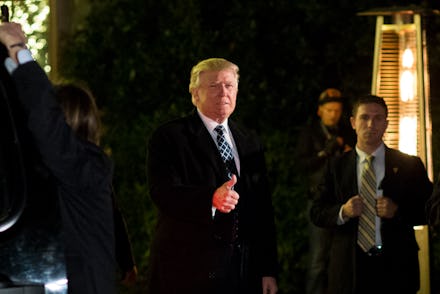Donald Trump's plan to control companies sending jobs overseas has 3 fatal flaws

President-elect Donald Trump doubled down on his promise to do battle with job-exporting corporations with a 35% tax in a series of tweets early Sunday morning.
Trump's tweets followed criticism of his and Vice President-elect Mike Pence's deal to use tax breaks to prevent the Carrier's Indianapolis factory from moving to Mexico. Skeptics argue having the government lobby factories one-by-one, whether using tax-incentive "carrots" or tax-penalty "sticks," is a recipe for inefficiency at best, and crony capitalism at worst.
In a column for Young Conservatives, Sarah Palin, a former vice presidential candidate, criticized the deal: "Politicians picking and choosing recipients of corporate welfare is railed against by fiscal conservatives, for it's a hallmark of corruption. And socialism," she wrote.
Here are some other crucial ways in which the Carrier deal — and Trump's threatened 35% tax — could pose problems for the American economy.
Japan tried Carrier-style deals before — and innovation stalled.
One playbook to look at for clues on how Trump's proposed tax could play out is Japan's. More than three decades ago, when the nation's economy was still booming, Japan's powerful bureaucratic government was active — and meddlesome — in controlling incentives and forcing companies to act in the public interest.
Known at the time as "administrative guidance," as Michael Schuman notes for Bloomberg, these efforts were initially seen as key to boosting Japan's global competitiveness.
But in the long term, Schuman argues, the policy proved to be Japan's undoing by creating two sets of rules: There was Japan's official rule of law, and then there was the "guidance," a more subtle set of rules about which companies would receive scrutiny from bureaucrats and which wouldn't.
When companies aren't all playing by the same rules, innovation can stall, for a lot of reasons: Favored companies may beat out more deserving competitors for contracts, through proximity to the right person in government. And domestic companies might be artificially protected from more innovative foreign counterparts, an unsustainable way to remain competitive.
Japan, which once produced corporate giants like Sony and Honda, today ranks among the least entrepreneurial of economically advanced countries.
Trump's threats lack moral authority.
One stronger argument in defense of Trump's plan, as University of Michigan economist Justin Wolfers pointed out to the New York Times, is the fact that it signals a backlash against companies that don't adequately weigh the public good in terms of their decision-making.
"If it's about changing norms, and saying private enrichment at the expense of the broader public good is no longer socially acceptable," Wolfers said. "That's important."
But, as Judd Legum of ThinkProgress points out in the below tweets, business leaders might have a hard time taking the proposed incentives and penalties as a serious shift toward earnest protectionism: The Trump Organization and Ivanka Trump's clothing company are known for importing and manufacturing goods overseas.
If the Trumps continue to lean on overseas labor, it's arguably a tougher sell to convince other United States businesses to respect anti-outsourcing rules.
Indeed, a consequence of Trump's plan may be giving a competitive edge to non-American firms — if they are permitted to outsource jobs from the U.S. without paying a penalty on the goods they send back, Wolfers pointed out.
Agreements like the Carrier deal could lead to budget shortfalls — and other unwanted consequences.
Economists and politicians worry that Trump's plan has big holes: For one, it could lead more companies to demand concessions from states in exchange for keeping jobs — like the $7 million tax subsidy Carrier received.
One problem is many states already give out big subsidies, which are expensive and create budgetary holes. For example, in Louisiana the state's $1 billion a year in corporate subsidies nearly matches a $1 billion budget shortfall.
Greg Albrecht, chief economist at Louisiana's legislative fiscal office, told the Wall Street Journal that Trump's proposal of selective taxation runs the risk of increasing what's called "moral hazard," in the system, which is what happens when one party in a transaction has an incentive to violate the spirit of the agreement.
In this case, Trump's plan to keep companies from moving overseas would increase the moral hazard by actually driving more companies to propose moving off-shore to qualify for the juicy tax subsidies Trump is seemingly willing to dole out.